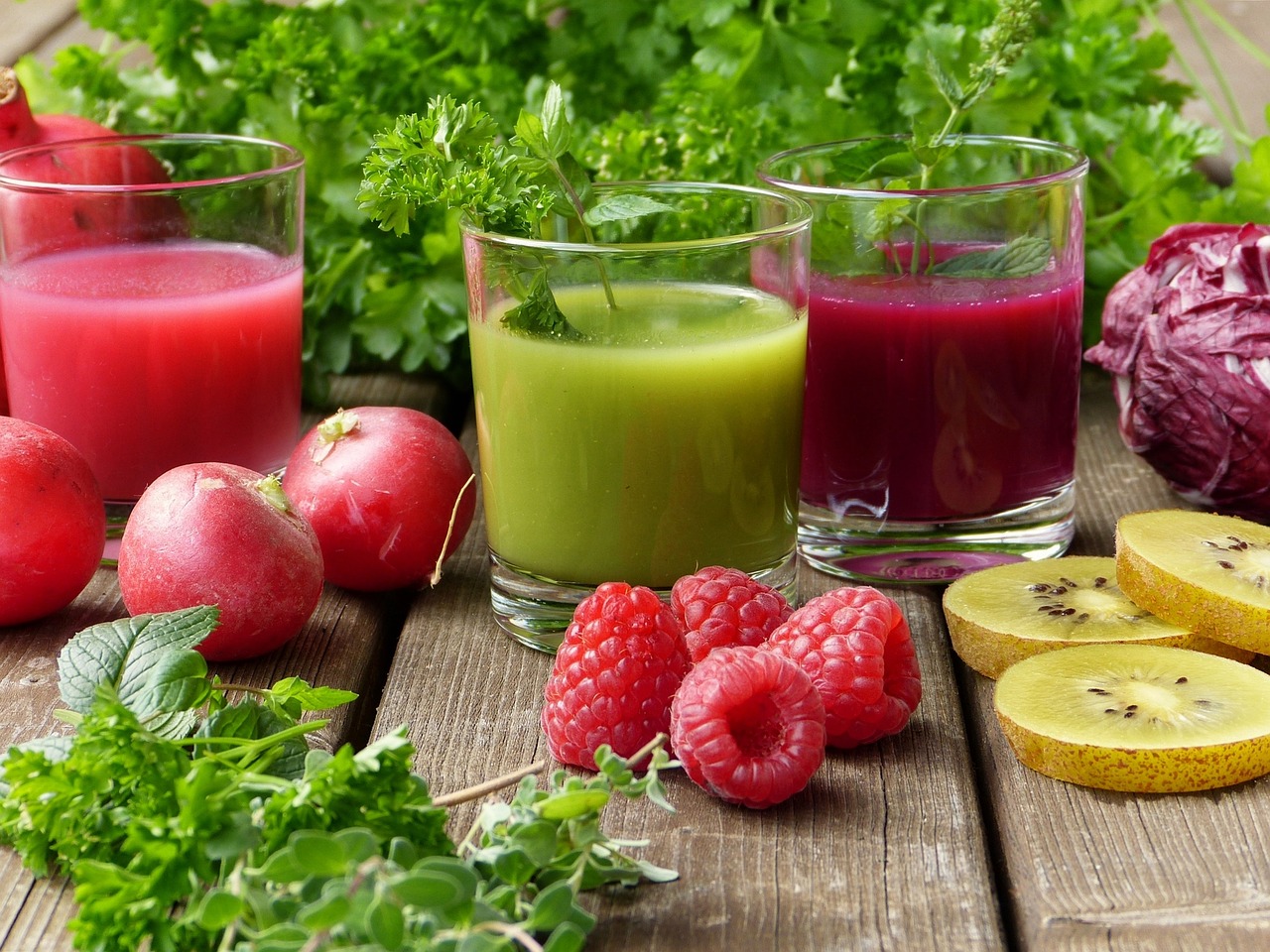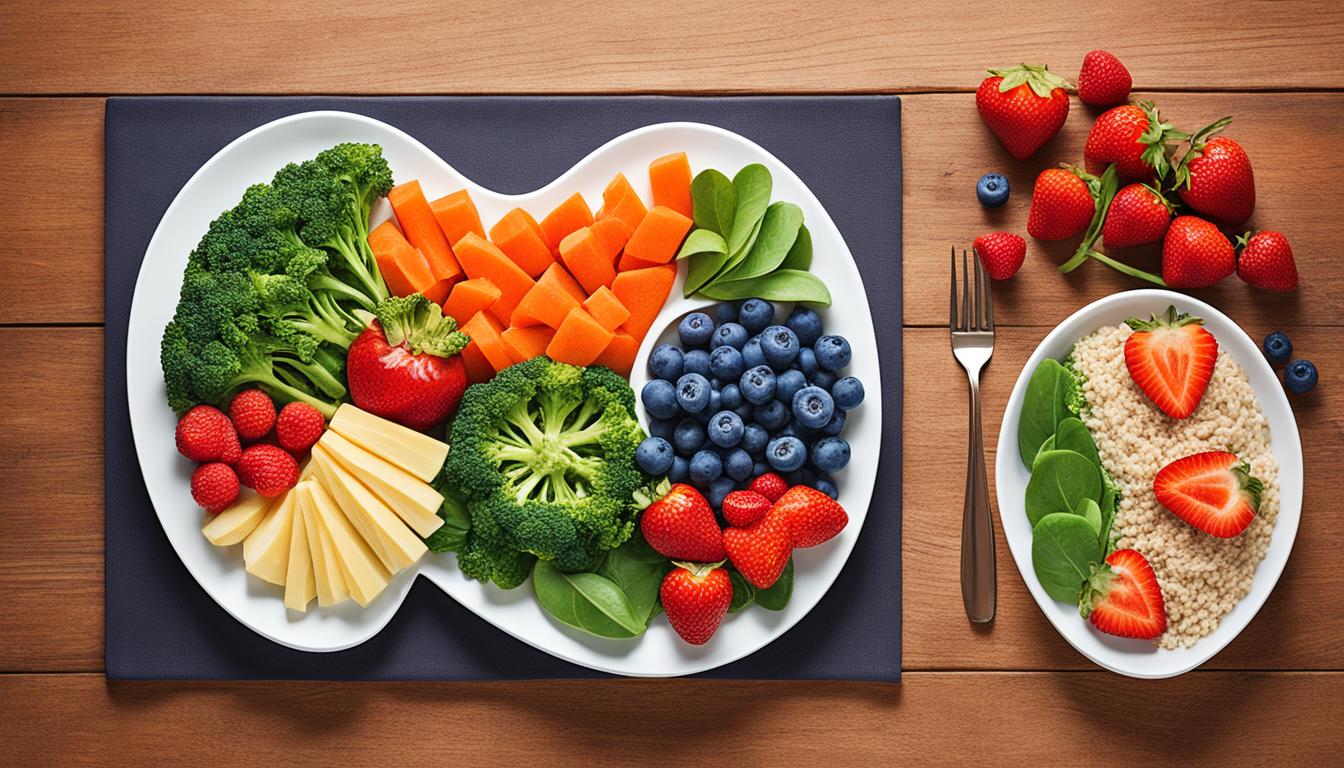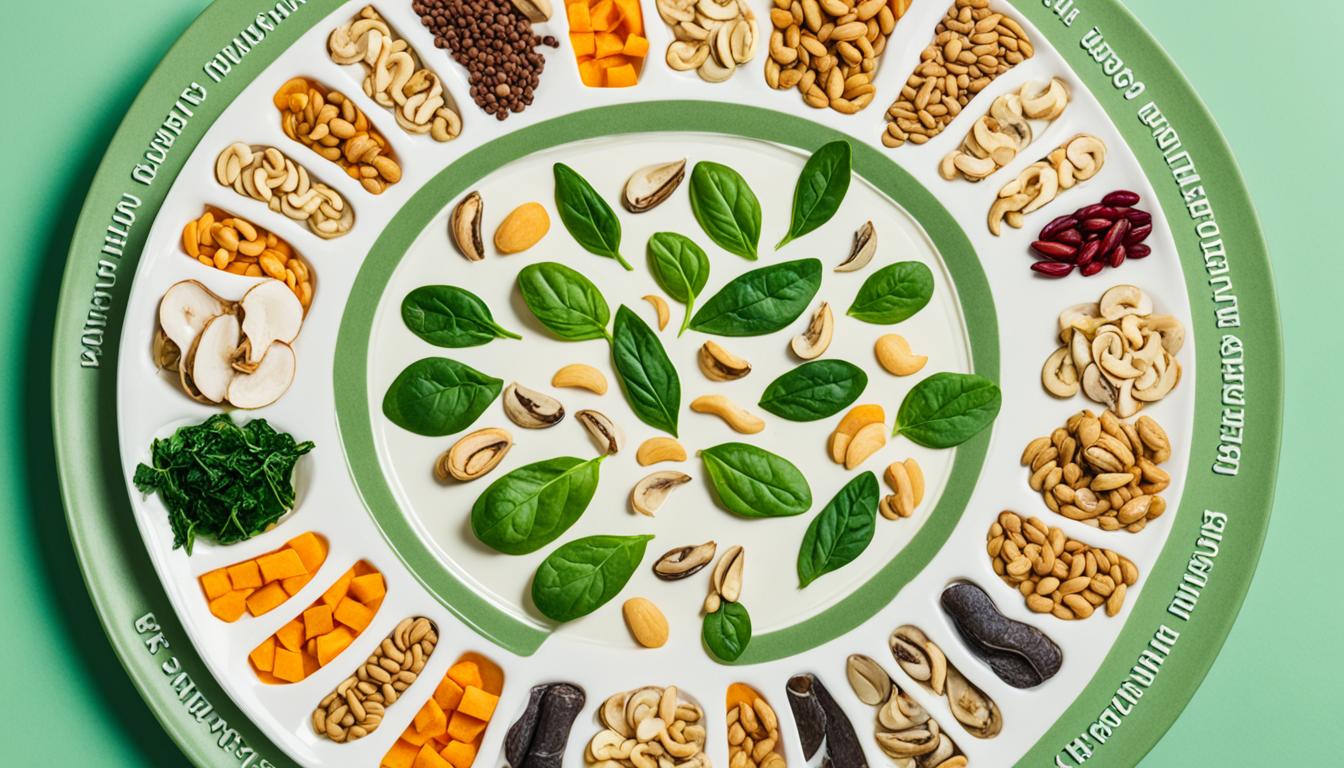Healthy Diet Tips for Pregnancy
Are you pregnant and wondering how to maintain a safe and healthy diet throughout your pregnancy? It’s essential to give your body and your growing baby the right nutrients for a healthy development. But what exactly should you be eating? And are there any foods you should avoid? Let’s unravel the secrets to a healthy pregnancy diet plan!
- Choose a mix of healthy foods from each food group to get the right nutrients.
- Avoid raw fish, undercooked meats, unpasteurized products, and deli meats to prevent harm to your baby.
- Get the right amount of calories for your stage of pregnancy.
- Take a prenatal supplement to meet your nutritional needs.
- Incorporate seafood low in mercury into your diet for healthy fats.
Follow a Healthy Eating Routine
Following a healthy eating routine during pregnancy is crucial to ensure that you and your baby get the right nutrients. It’s recommended to choose a variety of healthy foods from each food group, including whole fruits, vegetables, whole grains, lean proteins, low-fat dairy, and healthy oils. These foods provide important nutrients like protein, iron, folic acid, iodine, and choline, which are necessary for a healthy pregnancy. It’s also important to maintain a balanced diet and avoid excessive calorie intake.
Here are some tips to help you follow a healthy eating routine:
- Incorporate fruits and vegetables: Aim to include a colorful variety of fruits and vegetables in your meals. They are packed with essential vitamins, minerals, and fiber that support both your health and your baby’s development.
- Choose whole grains: Opt for whole grain bread, pasta, and rice instead of refined grains. Whole grains are rich in fiber, B vitamins, and minerals, providing sustained energy and digestive health benefits.
- Select lean proteins: Include lean sources of protein such as poultry, fish, legumes, and tofu in your diet. These foods are high in protein and low in unhealthy fats, providing essential amino acids for cell growth and repair.
- Incorporate low-fat dairy: Consume low-fat dairy products like milk, yogurt, and cheese to ensure an adequate intake of calcium, which is necessary for your baby’s bone development.
- Use healthy oils: Opt for healthier fats like olive oil, avocado oil, and canola oil for cooking and dressing your meals. These oils are a good source of monounsaturated fats, which are beneficial for heart health.
| Food Group | Examples |
|---|---|
| Fruits | Apples, bananas, oranges, berries |
| Vegetables | Broccoli, spinach, carrots, bell peppers |
| Whole Grains | Quinoa, brown rice, whole wheat bread |
| Lean Proteins | Chicken breast, salmon, lentils, tofu |
| Low-fat Dairy | Milk, yogurt, cheese |
| Healthy Oils | Olive oil, avocado oil, canola oil |
Incorporating healthy snacks into your eating routine can also help you satisfy cravings while providing essential nutrients. Consider options such as low-fat yogurt with fruit, whole-grain crackers with peanut butter, or carrots with hummus. These snacks are nutritious and can keep you energized throughout the day.
Remember, maintaining a healthy eating routine is essential for your overall well-being and the healthy development of your baby. Consult with your healthcare provider or a registered dietitian who specializes in prenatal nutrition for personalized advice and recommendations based on your specific needs and circumstances.
Get the Right Amount of Calories :
As your calorie needs change throughout pregnancy, it’s important to ensure you’re getting the right amount of calories for a healthy pregnancy. Most women with a healthy pre-pregnancy weight have specific calorie needs: no extra calories in the first trimester, about 340 extra calories a day in the second trimester, and about 450 extra calories a day in the last trimester. However, it’s essential to consult with your doctor or midwife to determine your specific calorie needs based on your pre-pregnancy weight and overall health. Proper weight gain during pregnancy is important, and your healthcare provider can guide you on the appropriate amount of weight to gain.
Knowing your calorie needs during pregnancy is crucial for maintaining a healthy diet. By ensuring you’re getting the right amount of calories, you can support the growth and development of your baby while also meeting your own nutritional requirements. Consulting with your healthcare provider will provide you with personalized guidance based on your specific circumstances.
Take a Prenatal Supplement :
Taking a prenatal supplement is essential for ensuring that you and your baby receive the necessary nutrients during pregnancy. Prenatal supplements, also known as prenatal vitamins, provide important vitamins and minerals that support your baby’s growth and development. These supplements are specifically formulated to meet the increased nutritional needs of pregnant women.
One of the key nutrients found in prenatal supplements is folic acid. This B vitamin is crucial for the development of your baby’s neural tube, which eventually becomes their brain and spinal cord. Adequate folic acid intake can help prevent birth defects of the brain and spine.
In addition to folic acid, prenatal supplements often contain iron, which is important for preventing anemia and supporting the production of red blood cells. Iron plays a vital role in delivering oxygen to your baby and supporting their overall growth and development.
Iodine is another essential nutrient found in prenatal supplements. It is necessary for the production of thyroid hormones, which play a crucial role in your baby’s brain development and metabolism.
Choline is a nutrient that is important for brain development and overall health. Unfortunately, many prenatal supplements do not contain adequate amounts of choline. It is recommended to discuss with your healthcare provider if you need to ensure adequate choline intake.
When choosing a prenatal supplement, look for one that contains the recommended amount of folic acid (400 to 800 mcg) and other essential nutrients. It is always a good idea to consult with your doctor or nurse to determine if you need additional supplements, such as iron or iodine, based on your specific needs.
Key Nutrients in Prenatal Supplements :
| Nutrient | Function | Sources |
|---|---|---|
| Folic Acid | Supports neural tube development | Leafy greens, fortified cereals, legumes |
| Iron | Prevents anemia, supports red blood cell production | Red meat, poultry, seafood, beans |
| Iodine | Aids in brain development and metabolism | Seafood, dairy products, iodized salt |
| Choline | Supports brain development and overall health | Eggs, lean meats, poultry, fish |
Remember to consult with your healthcare provider before starting any new supplements to ensure they are appropriate for you and your baby’s specific needs. They can provide personalized recommendations based on your overall health and medical history.
Incorporate Seafood in Your Diet :
Including seafood in your diet during pregnancy can provide healthy fats that are beneficial for you and your baby. However, it’s important to choose seafood that is low in mercury to avoid harm to your baby’s development.
Aim to consume 8 to 12 ounces of seafood each week, with at least one serving being oily fish like salmon, sardines, or mackerel. These fish contain omega-3 fatty acids, which are essential for brain development.
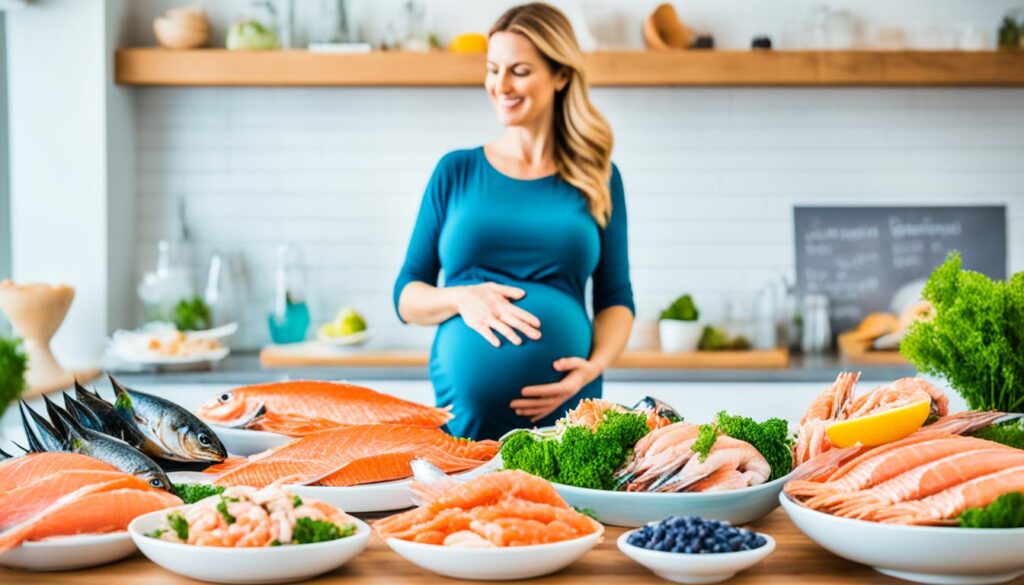
It’s essential to avoid certain fish high in mercury, such as shark, swordfish, and marlin. These fish have higher levels of mercury, which can be harmful to your baby’s nervous system and brain development.
Here’s a table that shows the mercury levels in different types of fish:
| Fish | Mercury Level |
|---|---|
| Salmon | Low |
| Sardines | Low |
| Mackerel | Low |
| Shark | High |
| Swordfish | High |
| Marlin | High |
By incorporating seafood into your diet, you can ensure that you and your baby receive the necessary nutrients for a healthy pregnancy. Just remember to choose low-mercury options and enjoy them in moderation as part of a balanced diet.
Foods to Avoid During Pregnancy
During pregnancy, it is crucial to be mindful of the foods you consume to ensure the safety and health of both you and your baby. Some foods should be avoided due to the potential risks they pose. These precautions are necessary to prevent harm caused by bacteria, parasites, or toxins that can affect fetal development.
Foods to Avoid:
- Raw or Rare Fish or Shellfish: Avoid consuming raw or undercooked seafood as it may contain harmful bacteria or viruses.
- Raw or Rare Meats or Poultry: These can carry bacteria like Salmonella, which can lead to food poisoning.
- Unpasteurized Juice, Milk, or Cheese: These products may contain harmful bacteria or parasites, such as Listeria or E. coli.
- Lunch or Deli Meats: These meats can contain Listeria, which is especially dangerous during pregnancy.
- Smoked Seafood: Smoked fish or seafood may contain Listeria or other harmful bacteria.
- Prepared Meat or Seafood Salads: These salads can also contain Listeria or other bacteria.
- Raw Sprouts: Alfalfa, clover, radish, and mung bean sprouts should be avoided due to the risk of bacterial contamination.
It is important to cook meats, seafood, and eggs thoroughly to eliminate any potential bacteria or parasites. When consuming dairy products, always check labels for pasteurization to ensure they are safe for consumption. Additionally, limit caffeine intake and completely avoid alcohol during pregnancy.
Following these guidelines will help safeguard the well-being of both you and your baby, contributing to a healthy and safe pregnancy.
| Foods to Avoid | Risks |
|---|---|
| Raw or Rare Fish or Shellfish | Potential exposure to harmful bacteria or viruses |
| Raw or Rare Meats or Poultry | Risk of food poisoning caused by bacteria like Salmonella |
| Unpasteurized Juice, Milk, or Cheese | Possible contamination with harmful bacteria or parasites |
| Lunch or Deli Meats | Potential presence of Listeria, which is especially dangerous during pregnancy |
| Smoked Seafood | Potential presence of Listeria or other harmful bacteria |
| Prepared Meat or Seafood Salads | Risk of contamination with Listeria or other bacteria |
| Raw Sprouts | Potential bacterial contamination in alfalfa, clover, radish, and mung bean sprouts |
Healthy Snack Choices
Making healthy snack choices is important during pregnancy. Opt for snacks that are low in fat and sugar but still provide important nutrients. Examples of healthy snacks include:
- Low-fat or fat-free yogurt with fruit
- Whole-grain crackers with peanut butter
- Carrots with hummus
If you’re experiencing morning sickness and nausea, try eating:
- Dry toast
- Dry cereal
- Saltines
It’s crucial to listen to your body and choose snacks that make you feel nourished and satisfied.
The Importance of Fluid Intake
Staying hydrated is essential for maintaining good health during pregnancy. Adequate fluid intake is crucial for both you and your baby’s well-being. Here are some key points to keep in mind:
- Aim to drink several glasses of water each day. Water is the best choice for hydration and helps your body function properly.
- Include fluids from sources like juices and soups to meet your hydration needs.
- Avoid excessive caffeine intake. High levels of caffeine can increase the risk of certain pregnancy complications.
- Avoid artificial sweeteners, as some studies suggest they may have negative effects on pregnancy.
- Avoid alcohol completely during pregnancy, as it can cause serious harm to your baby’s development.
- Add flavor to your water by infusing it with fruits or herbs. This can make hydration more enjoyable and encourage you to drink more.
By staying properly hydrated, you can help support digestion, prevent common pregnancy symptoms like constipation, and maintain overall well-being. Remember to consult with your healthcare provider for personalized advice and recommendations regarding your fluid intake during pregnancy.
| Fluid Intake Tips | Benefits |
|---|---|
| Drink several glasses of water each day | Supports overall hydration and bodily functions |
| Incorporate juices and soups | Provides additional fluids and nutrients |
| Avoid excessive caffeine | Reduces the risk of pregnancy complications |
| Avoid artificial sweeteners | Avoid potential negative effects on pregnancy |
| Avoid alcohol | Prevent harm to baby’s development |
| Add flavor with fruits or herbs | Makes hydration more enjoyable |
Key Components of a Healthy Lifestyle
In addition to a healthy diet, there are other key components of a healthy lifestyle during pregnancy. These include appropriate weight gain, regular exercise, and timely vitamin and mineral supplementation. It’s important to maintain a healthy weight gain throughout pregnancy, which can be achieved by following a balanced diet and being physically active with your healthcare provider’s guidance. Regular exercise can help improve your overall health and well-being during pregnancy. Lastly, taking prenatal vitamin and mineral supplements as recommended by your healthcare provider ensures you’re meeting your nutritional needs.
When it comes to weight gain, it’s essential to strike a balance to support a healthy pregnancy. Your healthcare provider can guide you on the appropriate amount of weight to gain based on your pre-pregnancy weight and overall health. Remember that excessive weight gain can increase the risk of complications, while inadequate weight gain can affect your baby’s development.
Regular exercise plays a significant role in maintaining a healthy pregnancy. It can help manage weight, alleviate pregnancy discomforts, boost energy levels, and reduce the risk of certain pregnancy-related conditions, such as gestational diabetes and high blood pressure. Consult with your healthcare provider to determine which exercises are safe and suitable for you during pregnancy. Activities like walking, swimming, prenatal yoga, and low-impact aerobics are generally considered safe options.
Alongside a healthy diet and regular exercise, taking prenatal vitamin and mineral supplements is crucial. These supplements ensure you’re obtaining essential nutrients like folic acid, iron, calcium, and vitamin D, which are vital for your baby’s growth and development. Be sure to follow your healthcare provider’s recommendations for the appropriate dosage and timing of supplementation.
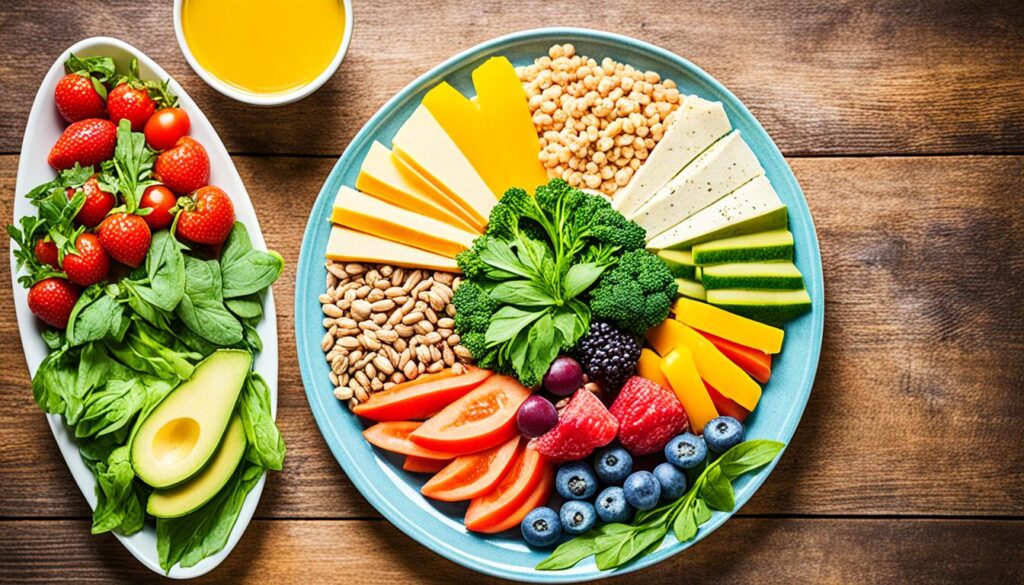
Incorporating these key components of a healthy lifestyle into your pregnancy journey can contribute to your overall well-being and help support a healthy pregnancy. Remember to consult with your healthcare provider for personalized advice and recommendations based on your specific needs and circumstances. By prioritizing your nutrition, staying active, and taking necessary supplements, you can optimize your health and vitality during this special time.
so , Maintaining a healthy diet during pregnancy is crucial for the well-being of both you and your baby. By following a healthy eating routine, you can ensure that you are providing the right nutrients for a healthy pregnancy. It is important to get the right amount of calories at each stage of pregnancy to support your body’s changing needs. Taking a prenatal supplement is also essential to meet your nutritional requirements, especially for key nutrients like folic acid, iron, iodine, and choline.
Incorporating seafood into your diet can provide important healthy fats, but it’s important to choose low-mercury options. Avoiding certain foods that can pose a risk to your baby’s development, such as raw fish and undercooked meats, is crucial. Making healthy snack choices, staying hydrated, and adopting a healthy lifestyle are also important factors to consider in supporting a vibrant pregnancy journey.
Consulting with your healthcare provider is essential for personalized advice and recommendations based on your specific needs and circumstances. Prioritizing your nutrition and making informed choices can help you achieve a healthy and vibrant pregnancy. Remember, maintaining a healthy diet during pregnancy is beneficial for both you and your baby’s well-being.
FAQ
How can I maintain a healthy diet during pregnancy?
What foods should I include in my pregnancy diet?
How many calories should I consume during pregnancy?
Are prenatal supplements necessary during pregnancy?
Can I eat seafood during pregnancy?
What foods should I avoid during pregnancy?
What are some healthy snack choices during pregnancy?
How important is fluid intake during pregnancy?
What are the key components of a healthy lifestyle during pregnancy?
How can I ensure a healthy pregnancy journey?





